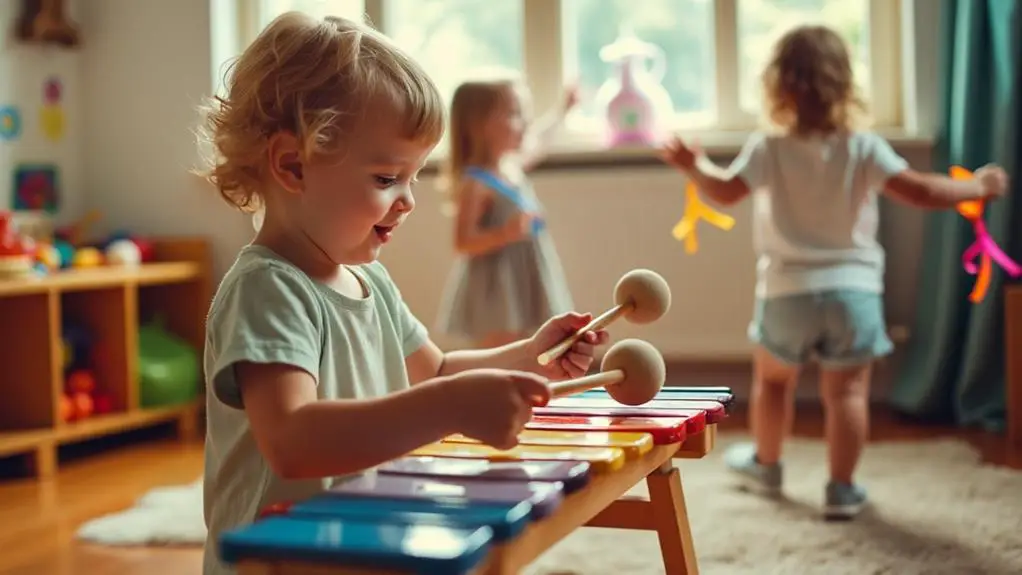The Role of Music in Child Development
As a parent and music educator, I've witnessed firsthand the transformative power of music in children's lives. It's not just about learning to play an instrument or sing; music shapes young minds in ways we're only beginning to understand. From boosting cognitive abilities to fostering emotional intelligence, the benefits are far-reaching. But what intrigues me most is how these early musical experiences can set the stage for a child's future success, not just in the arts, but across all areas of life. There's so much more to explore about this fascinating connection between music and child development.
Key Takeaways
- Music education enhances cognitive abilities, improving problem-solving skills, memory retention, and information processing.
- Early musical training strengthens neural pathways, contributing to better academic performance and emotional resilience.
- Group music activities foster social-emotional growth, developing empathy, self-regulation, and collaborative skills.
- Engagement in musical activities improves both fine and gross motor skills through coordination and movement.
- Music education positively impacts academic performance across various subjects, enhancing learning and cognitive development.
Cognitive Benefits of Musical Education
Numerous studies have shown that musical education offers substantial cognitive benefits for children. I've found that early exposure to music education strengthens neural pathways, enhancing problem-solving skills and emotional resilience.
It's fascinating to see how music training improves memory retention and information processing, leading to better academic performance.
The "Mozart effect" demonstrates that even listening to classical music can boost spatial-temporal reasoning, contributing to cognitive development in early childhood.
Research I've reviewed indicates a strong link between music education and increased verbal memory and intelligence.
What's more, children involved in group music training exhibit enhanced prosocial skills, including improved self-regulation and emotional understanding.
These findings highlight the significant role of music in brain development and emphasize its importance in early childhood education programs for ideal cognitive growth.
Social-Emotional Growth Through Music
Beyond cognitive benefits, music plays an essential role in children's social-emotional development.
I've observed that music programs foster emotional regulation and boost self-esteem, particularly through group activities. It's fascinating to see how musically trained children score higher on emotion comprehension tests, indicating enhanced emotional intelligence.
I've noticed that collaborative music-making experiences increase empathy and prosocial behaviors, improving social skills. The duration of music education also correlates positively with academic self-concept, suggesting it bolsters confidence in academic settings.
Group music activities teach crucial life skills like negotiation and active listening, contributing to overall social-emotional development.
In my experience, music education's impact on child development extends far beyond musical proficiency, shaping well-rounded individuals with strong social and emotional foundations.
Music's Impact on Motor Skills

Through various musical activities, children can greatly enhance their motor skills. I've observed that engaging in handclapping, dancing, and other rhythmic activities markedly improves coordination and overall physical development in early childhood.
Music exposure accelerates fine motor skill proficiency, aiding in tasks like writing and object manipulation. Participating in group music-making encourages children to synchronize movements with peers, fostering social interaction while refining their motor skills.
Research shows that movement to music strengthens balance and coordination, promoting gross motor skills essential for physical growth. I've seen how music experiences involving physical movement enhance body awareness in children.
Enhancing Academic Performance With Music
While music's impact on academic performance has been debated, recent studies have revealed compelling evidence of its positive effects.
I've found that structured musical instruction can greatly enhance children's learning, with effect sizes ranging from -1.30 to 1.64 in various academic areas. Music education boosts cognitive skills, improving performance metrics by 0.07 to 0.80.
It's clear that music training contributes to early childhood development in multiple ways:
- Enhancing memory retention and information processing
- Improving language development and verbal memory
- Raising standardized test scores, including SATs
I've observed that children engaged in music programs develop essential skills like patience and discipline, which are vital for academic success.
The integration of music in educational settings not only fosters cognitive growth but also creates effective learning environments, ultimately enhancing overall academic performance.
Conclusion
I've seen firsthand how music transforms children's lives. It's not just about learning notes; it's about revealing potential. Through music, I've watched kids become better problem-solvers, more empathetic friends, and more coordinated individuals. It's amazing how a simple melody can boost academic performance and emotional well-being. I'm convinced that integrating music into children's lives isn't just beneficial—it's essential for their holistic development and future success.







